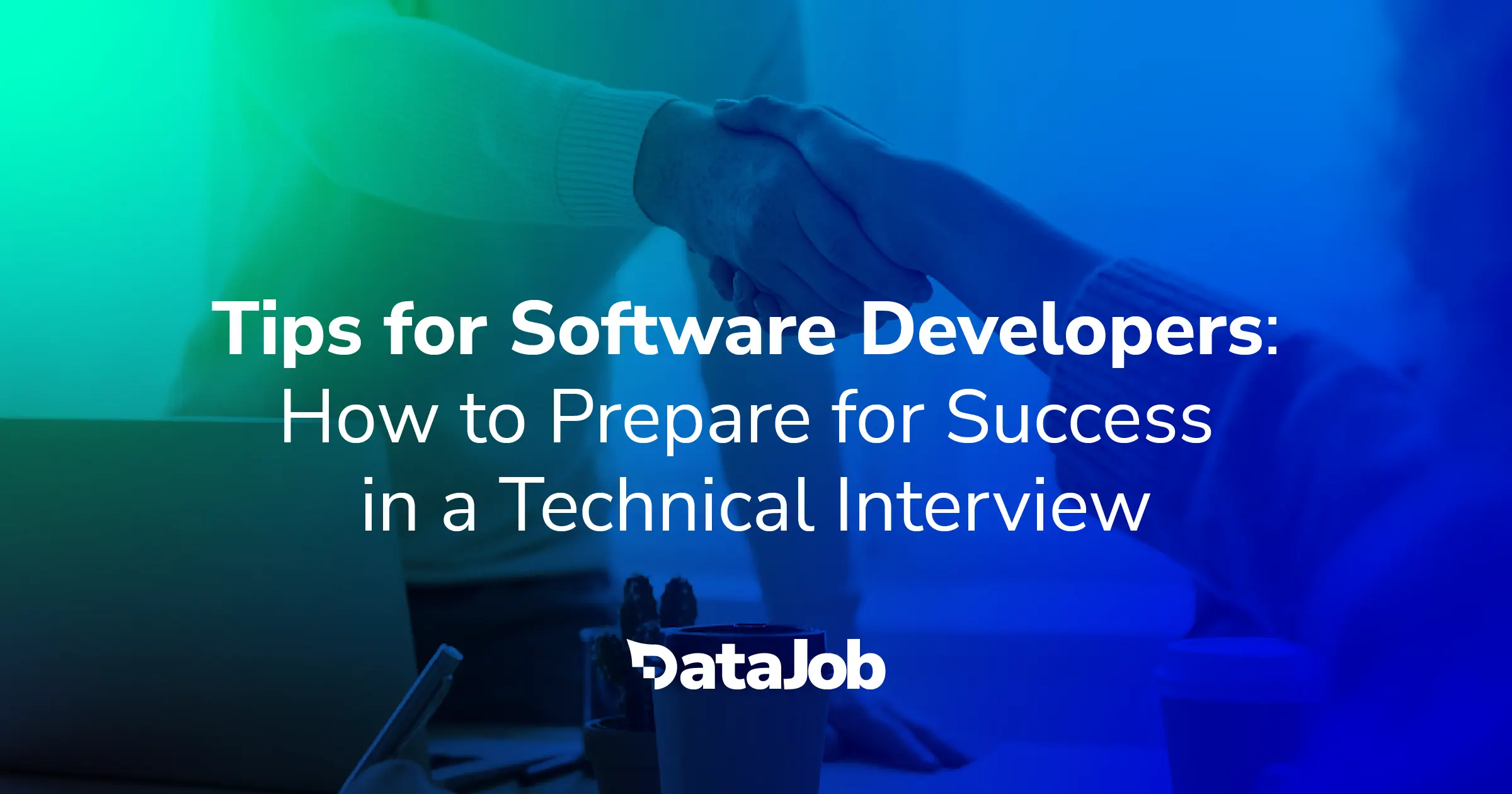As a software developer, the technical job interview is your chance to showcase your skills, knowledge, and enthusiasm for the job. In fact, mastering the right interview tips for software developers is just as important as perfecting your resume and portfolio. Whether you are a seasoned professional or just starting out, it’s crucial to prepare well so you can make a positive impression and secure the job you want. Your level of preparation, professionalism, and enthusiasm for the interview and the company is immediately noticeable, and can make a strong impression on the interviewer.
In this blog post, we provide 19 essential tips on what to do before, during, and after your interview, along with additional tips to help you present yourself in the best possible light and succeed in your technical interview. Keep on reading and you’ll be one step closer to landing your dream job as a software developer.
Before the Interview – Time to Prepare Yourself
1. Research the Company
One of the crucial interview tips for software developers is to spend time researching the company. Visit their website to explore their products and services and understand their values, business, and mission. Check their LinkedIn profile and other social media channels, and consider reaching out to someone you know who works there to gain some insight. This will give you a better idea of what the company is looking for in a candidate, and help you tailor your responses to their specific needs.
2. Prepare Your Story
It’s important to create a clear and compelling narrative that showcases your personality, skills, and work experience. Create a brief and concise story that highlights your relevant accomplishments and skills. A great way to do this is by mapping your experience against the job description. Provide specific examples of how you have applied your skills in previous roles using the STAR method (Situation, Task, Action, Result) to structure your examples and make them easy to follow. This will help the interviewer understand how you stand out from other candidates and how you can contribute to the company’s success.
3. Practice Common Interview Questions and Technical Questions
Prepare answers for common interview questions such as “Tell me about yourself,” “Why do you want to work for our company?” or “Why did you apply for this position?” Also, don’t forget to prepare for technical questions for the role you are applying for. Be ready for an in-depth discussion of your experience and skills, as well as your strengths and weaknesses. Be honest and show that you have self-awareness. Understand the requirements for the role and prepare examples of how your knowledge and skills match them. Explain how you can contribute to the team and add value to the organization.
4. Prepare Questions for the Interviewer
Asking thoughtful questions not only demonstrates your enthusiasm and interest in the position, but also provides the interviewer with valuable information to determine whether you are a suitable candidate for the position and the company. Prepare a list of questions about the company culture, the team, opportunities for growth and development, specific responsibilities of the role, and how the success of the position will be measured.
5. Check Your Equipment
If the interview is online, make sure to test your equipment before the interview. Ensure that you have a reliable internet connection and that your computer and webcam are functioning properly. Familiarize yourself with the video conferencing software that will be used for the interview. Set up a neutral background and ensure good sound and lighting. Additionally, conduct the interview in a quiet environment to minimize background noise. This will help you avoid technical issues and distractions during the interview, and enable the interviewer to see and hear you clearly.
During the Interview – Time to Shine
6. Dress Professionally
Make a good first impression by dressing professionally, even if the interview is online. Dress in a professional, business-casual manner that is in line with the company’s culture. It demonstrates your respect for the interviewer and the company. It will help you feel more confident and focused on showcasing your experience during the interview.
7. Be Punctual
Arrive on time for the interview, whether it’s in-person or online. If it’s an online interview, log in 10 minutes in advance to test your equipment, internet connection, and surroundings for any potential distractions.
8. Be Mindful of Your Body Language
Maintain eye contact, sit up straight, offer a firm handshake, and avoid fidgeting. Project a friendly and open attitude, smile appropriately, and adapt to the interviewer’s style. Good body language can help you appear confident and engaged.
7. Active Listening
Listen carefully to the interviewer’s questions and provide honest and concise answers. It’s acceptable to take a moment to think before responding or to ask for clarification if needed. For online interviews, it’s important to verbally confirm your engagement, as nonverbal cues may be harder to read through the screen.
10. Show Interest and Enthusiasm
Express your interest in the position and the company throughout the interview. Demonstrate enthusiasm for the role you applied for. Show that you’re excited about the opportunity to work with the team and contribute to the company’s success. Don’t forget to ask the questions you’ve prepared beforehand to show that you’re curious about the position and to leave a positive impression on the interviewer.
After the Interview – Time to Reflect and Connect
11. Follow Up
Send a thank-you email to the interviewer, to show your gratitude for the time and consideration they’ve given you. Express your appreciation for the opportunity to learn more about the role and the company, and reiterate your interest in the position. This not only demonstrates your professionalism, interest, and good manners, but also helps keep you top of mind with the interviewer as they consider candidates.
12. Connect on LinkedIn
If you haven’t already, connect with the interviewer on LinkedIn as a way to build your professional network and stay in touch for future opportunities.
13. Evaluate Your Performance
Once the interview is over, take some time to evaluate your performance. Think about what you did well during the interview and consider what you could have done better. Reflecting on your performance can help you improve your interviewing skills and prepare for future interviews. Additionally, try to get feedback from the interviewer; this will help you identify areas of strength and improvement for your next interview.
14. Prepare Next Steps
If the interviewer indicated that there would be a second interview or additional steps in the hiring process, prepare for those by researching the company further and practicing your interview skills.
Additional Tips for the Most Ambitious
15. Practice, Practice, Practice
Practicing is an essential component of interview preparation and one of the most valuable interview tips for software developers. The more you practice, the more confident and comfortable you’ll feel during the interview. Consider running a digital interview beforehand with someone to test your setup and equipment. Additionally, practice your pitch and answers to common interview questions with someone who can provide honest feedback and help you identify areas for improvement.
16. Supporting Notes
Having supporting notes can be beneficial during the interview. Keep them in front of you or place them at eye level behind the computer if the interview is online. This can help you structure your thoughts and present them in a clear and organized way, which can reduce nerves and increase confidence. However, avoid relying on them too heavily and try to maintain good eye contact and stay engaged in the conversation.
17. Strengthen Your Non-Technical Skills
In addition to technical competence, companies value employees who possess non-technical skills, such as collaboration, communication, adaptability, self-motivation, and willingness to serve. They appreciate knowledge sharing, attention to detail, a quality-oriented mindset, problem-solving skills, and the ability to learn and adapt quickly to new environments, tools, or systems.
18. Be Yourself
Be honest, genuine, and authentic. Be confident in your abilities, but also humble and willing to learn and grow. Demonstrate that you are a team player who is open to feedback and willing to work with others. This will help the interviewer get a sense of who you are as a person and whether you’re a good fit for the company.
19. Expect the Unexpected
Despite your best efforts, there may be unforeseen challenges or interruptions during the interview. In case you experience technical issues, distractions, or interruptions from other people, stay calm and composed. This demonstrates your ability to handle unpredictable challenges and work well under pressure. Additionally, be prepared for unexpected questions that may catch you off guard and test your ability to think on your feet and respond appropriately. Stay positive and optimistic, even if you make a mistake or stumble over a question. Try to move on and focus on the rest of the interview.
TL;DR? Let’s Summarize
The interview process for a software developer position is critical to the hiring process. By following these interview tips for software developers, you can go into your next technical interview with confidence, knowing that you’re well-prepared and ready to make a great impression.
Remember that preparation is key. It can increase your chances of success and boost your confidence during the interview. The more you know about the company, the better you can answer interview questions and show that you are a good fit for their culture and needs.
Use these tips to make a good impression from start to finish. Begin by researching the company, preparing your story, practicing common interview questions, and preparing questions for the interviewer. Don’t forget to check if your equipment is ready before the interview. During the interview, make sure to be on time, dress professionally, be aware of your body language and nonverbal communication, be an active listener, and demonstrate genuine interest and enthusiasm. Finally, after the interview, follow up with a thank-you email and reflect on the experience to improve your skills for future opportunities. It’s fierce competition, and demonstrating commitment and interest can make all the difference. Good luck, and we hope these interview tips for software developers help you in your next technical interview.
Explore Career Opportunities at DataJob
As you prepare to ace your next technical interview, don’t forget to explore the exciting career opportunities available at DataJob. We are always on the lookout for talented and passionate individuals to join our team. Visit our careers page to browse our current job openings and find the perfect role that matches your skills and career aspirations. At DataJob, we offer a dynamic and supportive work environment where you can grow, innovate, and make a real impact.




